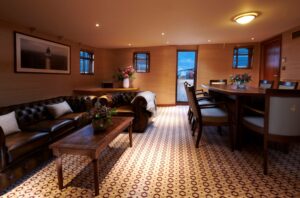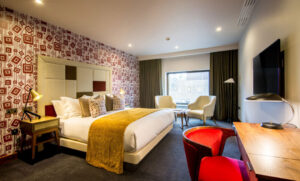Contract furniture production, in essence, pertains to the specialised manufacturing of furniture designed for commercial, institutional, or contractual use. Unlike residential furniture, which caters to individual consumers, contract furniture is meticulously crafted with the specific needs and demands of businesses, organizations, and institutions in mind.
The Craftsmanship Behind Contract Furniture Production
This description outlines the artistry involved:
- Precision in Design: To commence, contract furniture production initiates with a fastidious design process. Accomplished designers and architects collaborate closely to conceptualize pieces that not only possess aesthetic appeal but also fulfil their designated functions. We meticulously consider each aspect, from dimensions to materials, to adhere to the specific requirements of the commercial environment.
- Careful Material Selection: Additionally, artisans select materials based on their durability, safety attributes, and visual charm. Premium woods, metals, fabrics, and finishes are chosen to ensure longevity and adherence to safety standards. These materials often undergo rigorous testing to ensure their strength and resistance to wear and tear.
- Skillful Manufacturing: What’s more, the manufacturing process relies on a team of adept craftsmen who breathe life into the designs. Whether it’s the creation of ergonomic office chairs, sturdy restaurant tables, or customized hotel furnishings, these skilled artisans employ their expertise to shape materials into functional and aesthetically pleasing pieces.
- Stringent Quality Assurance: Furthermore, quality control is pivotal in contract furniture production. Every piece undergoes exhaustive testing to ascertain its compliance with industry standards and alignment with the specific project requirements. However, this includes assessments of structural integrity, safety features, and adherence to design specifications.
- Ergonomic Considerations: The application of ergonomic principles is another aspect that enhances the comfort and user-friendliness of the furniture. Designers thoughtfully create office chairs to provide lumbar support and comfort during extended work periods, while they prioritize the comfort of guests when designing hotel furniture.
- Meticulous Attention to Detail: Furthermore, craftsmen meticulously focus on the minutest details, guaranteeing that each piece is flawless and visually pleasing. Moreover, he encompasses precise stitching on upholstered furniture, impeccable wood finishes, and scrupulous welding on metal structures.
Custom Solutions: Contract Furniture Production for Businesses
Crafting custom solutions through contract furniture production for businesses involves the tailoring of furniture to meet the specific needs, preferences, and functional requirements of commercial and institutional spaces. Furthermore, here’s a detailed description of how contract furniture production provides bespoke solutions for businesses:
- Design Customization: With a clear understanding of the client’s requirements, the contract furniture manufacturer customizes the furniture design. Moreover, this may involve creating unique pieces, modifying existing designs, or even designing furniture from scratch to perfectly align with the business’s vision.
- Material Selection: Material selection is tailored to meet the client’s requirements, whether it’s choosing durable materials for high-traffic areas, selecting fabrics that match the company’s branding, or ensuring materials are in compliance with safety and environmental standards. This step is critical to meeting custom needs.
- Dimensions and Layout: Furniture dimensions and layout are adjusted to fit the specific space. However, This ensures that each piece fits seamlessly within the business environment, maximizing functionality and aesthetics.
- Branding Integration: For many businesses, branding is a crucial aspect of their identity. Contract furniture production allows for the integration of branding elements into the furniture, such as custom upholstery with logos, color schemes, and design elements that reflect the business’s identity.
- Aesthetics: Aesthetics play a vital role in custom solutions. Furniture is designed to not only meet functional requirements but also to create a visually appealing environment that aligns with the business’s overall design concept.
- Quality Assurance: Every custom piece undergoes rigorous quality assurance to ensure it meets industry standards and adheres to the specific design and safety requirements set by the client.
- Ongoing Support: Contract furniture manufacturers often provide ongoing support, including maintenance and updates, to ensure the custom furniture continues to serve its intended purpose effectively over time.
Contract Furniture Manufacturing: Quality and Durability Guaranteed
Contract furniture manufacturing places a strong emphasis on quality and durability to meet the specific demands of commercial, institutional, and contractual settings. Here’s a detailed description of quality and durability in contract furniture manufacturing:
- Sturdy Material Selection: Contract furniture manufacturers meticulously choose materials known for their strength and durability. They opt for high-quality woods, metal alloys, and engineered materials to ensure that the furniture can withstand the rigours of frequent use in commercial spaces. These materials undergo rigorous testing for durability, wear resistance, and compliance with safety standards.
- Rigorous Quality Control: Quality control is a fundamental aspect of contract furniture manufacturing. Every piece undergoes comprehensive testing and inspection to ensure it aligns with industry standards.
- Customisation for Durability: Furniture is often customised to enhance durability, tailored to its intended use. For example, chairs in a restaurant might feature reinforced joints and stain-resistant upholstery to withstand spills and heavy use. Manufacturers adapt designs accordingly, attuning themselves to the unique challenges faced by different businesses.
- Ergonomics and Comfort: While durability is paramount, contract furniture is also designed with ergonomics in mind to ensure user comfort during extended periods of use. Therefore, manufacturers engineer ergonomic office chairs to provide lumbar support and comfort without compromising structural integrity.
- Aesthetic Durability: The durability of contract furniture extends to aesthetics. Furniture is meticulously designed to maintain its visual appeal over time. High-quality finishes, stain-resistant fabrics, and scratch-resistant coatings help the furniture retain its fresh and appealing look, even in high-traffic areas.
- Regulatory Compliance: Contract furniture manufacturers diligently ensure that their products comply with all relevant industry standards and regulations. This encompasses safety, fire codes, and materials regulations, which are essential for the use of furniture in public spaces.
Exploring the World of Commercial Furniture Production
Exploring the world of commercial furniture production unveils a realm of creativity, precision, and functionality. Furthermore, Here’s an exploration of the captivating world of commercial furniture production in British English with added transition words:
- Varied Market Demands: To commence, commercial furniture production accommodates many clients. This includes offices, hotels, restaurants, healthcare facilities, educational institutions, and more. Each sector presents unique requirements, contributing to a diverse and dynamic market.
- Emphasis on Design Excellence: Furthermore, the world of commercial furniture is characterised by a dedication to design excellence. Talented designers and architects collaborate to create furniture that seamlessly merges aesthetics with functionality.
- Meticulous Material Selection: The choice of materials is a critical aspect of commercial furniture production. Manufacturers meticulously select materials that balance durability, safety, and aesthetics. People guide the selection process for furniture based on its intended use, considering options that range from robust wood and metal to eco-friendly choices.
- Bespoke Customisation: Additionally, customisation is a cornerstone of commercial furniture production. Businesses often seek furniture that aligns with their brand identity, space dimensions, and functionality requirements. Manufacturers tailor designs, materials, and finishes to deliver bespoke solutions.
- Ergonomics and Comfort: Notably, ergonomics play a crucial role in the production of office furniture. Ergonomically designed chairs and desks aim to enhance user comfort, reduce the risk of strain or injury, and promote productivity during long work hours.
- Rigorous Quality Assurance: On the other hand, rigorous quality control processes ensure that every piece of commercial furniture meets industry standards. This encompasses structural integrity, safety features, fire codes, and adherence to design specifications.
- Aesthetic Appeal: Moreover, commercial furniture isn’t just about function; it’s also about aesthetics. Quality finishes, upholstery, and attention to detail contribute to an appealing look that complements the overall interior design of the space.
Designing Excellence: The Contract Furniture Production Process
Furthermore, Design excellence is at the core of the contract furniture production process. It involves a meticulous journey that blends creativity, functionality, and precision to craft furniture that meets the unique needs of businesses, institutions, and organizations. Here’s an exploration of this process:
- Client Consultation: The process begins with in-depth consultations with clients, where their specific needs and preferences are understood. This phase lays the foundation for the design concept.
- Concept Development: Once the client’s requirements are clear, designers and architects work on creating a concept that aligns with the client’s vision while considering functionality and aesthetics.
- Material Selection: Meticulous selection of materials is a critical step. Manufacturers carefully choose materials that balance durability, safety, and aesthetics. These materials undergo rigorous testing to ensure they meet industry standards.
- Customization: Every piece is customized to enhance its functionality and align with the client’s unique requirements. Whether it’s office furniture, hotel furnishings, or healthcare equipment, customization ensures the furniture serves its intended purpose.
- Ergonomics and Comfort: Ergonomics is a key consideration, especially in office furniture production. Designers create ergonomically designed chairs and workstations to promote user comfort, reduce strain, and boost productivity.
- Sustainability: Sustainable practices are increasingly integrated into the production process. This includes using eco-friendly materials and adopting efficient manufacturing processes to reduce the environmental footprint.
- Quality Assurance: Rigorous quality control processes are in place to ensure that every piece of furniture meets industry standards. Authorities closely monitor structural integrity, safety features, fire codes, and design specifications.
- Aesthetic Appeal: Aesthetic considerations are paramount. High-quality finishes, upholstery, and attention to detail contribute to an appealing look that complements the overall interior design.
- Regulatory Compliance: Adherence to safety and industry regulations is a non-negotiable aspect of the process. However, this ensures that the furniture complies with safety standards, fire codes, and materials regulations.
The Art and Science of Contract Furniture Manufacturing
The design of contract furniture involves a delicate balance between artistic creativity and scientific precision. Let’s delve into the amalgamation of art and science in contract furniture manufacturing:
- Client Collaboration (The Artistic Dimension): To initiate the process, the comprehension of the client’s vision, preferences, and specific requirements emerges as an art form in itself. Designers and architects closely engage with clients to metamorphose their ideas into functional and aesthetically pleasing furniture.
- Conceptualization (The Artistic Dimension): Subsequently, the development of the initial concept for a piece of furniture demands a creative touch. It involves considering not only the practical aspects but also the visual and emotional impact of the design.
- Material Selection (The Scientific Aspect): The meticulous selection of materials takes on a scientific character. Manufacturers must carefully evaluate factors such as material strength, durability, safety standards, and environmental impact, making it a precise decision-making process.
- Customization (The Intersection of Art and Science): Tailoring furniture to meet a client’s specific requirements represents a fusion of art and science. It necessitates creative problem-solving to find the best design while ensuring technical feasibility.
- Sustainability (The Scientific Aspect): Further integration of sustainable practices is rooted in environmental science. Manufacturers explore eco-friendly materials and employ efficient manufacturing processes to minimize their environmental footprint.
- Quality Control (The Scientific Aspect): Quality assurance assumes a scientific role within the production process. It encompasses rigorous testing, adherence to industry standards, and meticulous record-keeping.
- Aesthetics (The Artistic Element): Aesthetic appeal underscores the artistic facet of production. It involves the selection of appropriate colors, textures, and finishes that harmonize with the overall design concept and client preferences.
- Regulatory Compliance (The Scientific Aspect): Lastly, adherence to safety and industry regulations adopts a clear-cut, scientific approach. It entails meeting standards set by regulatory bodies, leaving no room for artistic interpretation.
Why Choose Professional Contract Furniture Production Services?
However, Selecting professional contract furniture production services provides numerous advantages, making it a strategic choice for businesses, institutions, and organizations. Furthermore, Here are compelling reasons to opt for these services:
- Expertise and Experience: Professional manufacturers offer a wealth of knowledge and experience. They grasp the intricacies of furniture production, ensuring that the final products meet the highest standards.
- Customization: Professional services deliver tailored solutions. They collaborate closely with clients to create furniture that perfectly aligns with their unique requirements, whether it’s for an office, hotel, or healthcare facility.
- Quality Assurance: Quality is a top priority. Professional services implement rigorous quality control measures, ensuring that every piece of furniture complies with safety and industry standards.
- Efficiency: Professionals streamline the production process, ensuring timely delivery. However, this efficiency is crucial for businesses aiming to furnish their spaces without unnecessary delays.
- Ergonomics and Comfort: Designing ergonomic and comfortable furniture is paramount. Professional manufacturers craft furniture that promotes user well-being, especially in office and healthcare settings, enhancing productivity.
- Sustainability: Many professional manufacturers incorporate sustainable practices. They use eco-friendly materials and manufacturing methods to reduce the environmental impact, aligning with contemporary sustainability goals.
- Regulatory Compliance: Ensuring furniture adheres to safety and industry regulations is a complex task. Professional services have the expertise to navigate these requirements seamlessly.
- Aesthetic Appeal: The aesthetics of the furniture are carefully considered. Professionals pay attention to finishes, upholstery, and design details to create visually appealing pieces that complement the overall interior design.
- Cost-Effectiveness: While professional services may come at a cost, their efficiency and ability to avoid costly mistakes in the production process can ultimately save money in the long run.
- Reliability: Professional manufacturers are known for their reliability. They deliver as promised, ensuring that clients receive the furniture they need when they need it.
Care Home Furniture in the UK: Enhancing Comfort and Safety
Follow Us on Linkedin




